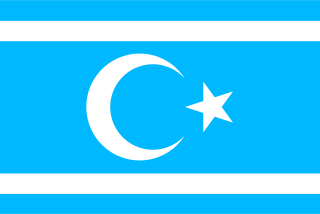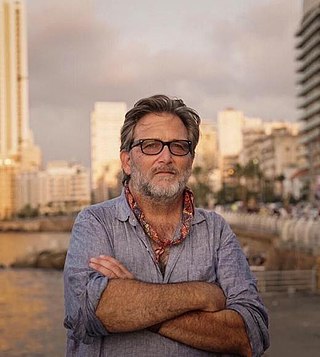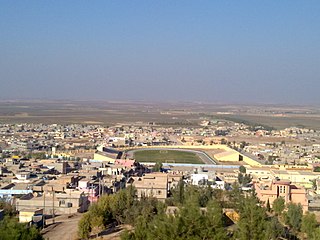Related Research Articles

Kurdistan, or Greater Kurdistan, is a roughly defined geo-cultural region in West Asia wherein the Kurds form a prominent majority population and the Kurdish culture, languages, and national identity have historically been based. Geographically, Kurdistan roughly encompasses the northwestern Zagros and the eastern Taurus mountain ranges.

Kirkuk Governorate or Kirkuk Province is a governorate in northern Iraq. The governorate has an area of 9,679 square kilometres (3,737 sq mi). In 2017, the estimated population was 1,259,561 people. The provincial capital is the city of Kirkuk. It is divided into four districts.

The Sykes–Picot Agreement was a 1916 secret treaty between the United Kingdom and France, with assent from the Russian Empire and the Kingdom of Italy, to define their mutually agreed spheres of influence and control in an eventual partition of the Ottoman Empire.

The Iraqi Turkmen Front is a political movement representing the Iraqi Turkmen people. It was founded on April 5, 1995 as a coalition of several Turkmen parties operating within the framework of Iraq's unity. The party aims for the Turkmen community to have greater political involvement, increased recognition and more rights.
Derek Hopwood OBE was an Emeritus Fellow of St Antony's College, Oxford, and University Reader in Modern Middle Eastern Studies. Hopwood was the founding president Middle East Libraries Committee, a post which he kept until 1990. He was holder of the RISMES Award (2003) for Services to Middle Eastern Studies in Britain. He held visiting professorships at several international Universities, such as University of Provence, University of Khartoum, Ain Shams University, and Pennsylvania. He was also for several years director of the Middle East Centre (MEC) at St Antony's College.
Michael M. Gunter is a professor of political science at Tennessee Technological University in Cookeville, Tennessee and considered an authority on the Kurds in Turkey, Iraq, Syria, and Iran. Brendan O’Leary referred to Gunter as, "The doyen of Kurdish political studies in the United States,” while Martin van Bruinessen wrote that Gunter is "probably the most prolific of today’s scholars of Kurdish politics.” Gunter has written or edited more than 15 books on the Kurdish struggle and 2 more criticized for promoting Armenian genocide denial. Two of those books on the Kurds were among the first analyses in English in modern times of the Kurdish unrest in the Middle East. In writing his analyses, Gunter has worked directly with top Kurdish and other Middle Eastern political leaders. He received the Kurdish Human Rights Watch's “Service to the Kurds Award” in 1998. "Gunter’s analyses and writings sometimes strike readers as controversial, but he says his views are often based on information that hasn't yet been made public." He has served as the secretary-general of the EU Turkey Civic Commission (EUTCC), an NGO in Brussels that lobbies the EU parliament on behalf of the Kurds since 2009. He is a member of the Board of Advisory Editors of The Middle East Journal, The Journal of South Asian and Middle Eastern Studies, and The International Journal of Turkish Studies, among others.

Anti-Turkish sentiment, also known as Anti-Turkism, or Turkophobia is hostility, intolerance, or xenophobia against Turkish people, Turkish culture and the Turkish language.

The Iraqi Turkmen, also referred to as Iraqi Turks, Turkish-Iraqis, the Turkish minority in Iraq, and the Iraqi-Turkish minority are Iraq's third largest ethnic group. They make up to 13% of the Iraqi population and are native to northern Iraq. Iraqi Turkmen share ties with Turkish people, and do not identify with the Turkmen of Turkmenistan and Central Asia.
Syrian Turkmen are Syrian citizens of Turkish origin who mainly trace their roots to Anatolia. Turkish-speaking Syrian Turkmen make up the third largest ethnic group in the country, after the Arabs and Kurds respectively.
Doug Stokes is a British academic who is Professor in International Security and Strategy in the Department of Politics at the University of Exeter. He was born in 1972 in Hackney, East London. His father was a gardener and sign writer and his mother was a cleaner and secretary. He was educated in London inner city state schools and left home at 17, and Hackney when 25.

United States foreign policy in the Middle East has its roots in the early 19th-century Tripolitan War that occurred shortly after the 1776 establishment of the United States as an independent sovereign state, but became much more expansive in the aftermath of World War II. With the goal of preventing the Soviet Union from gaining influence in the region during the Cold War, American foreign policy saw the deliverance of extensive support in various forms to anti-communist and anti-Soviet regimes; among the top priorities for the U.S. with regards to this goal was its support for the State of Israel against its Soviet-backed neighbouring Arab countries during the peak of the Arab–Israeli conflict. The U.S. also came to replace the United Kingdom as the main security patron for Saudi Arabia as well as the other Arab states of the Persian Gulf in the 1960s and 1970s in order to ensure, among other goals, a stable flow of oil from the Persian Gulf. As of 2023, the U.S. has diplomatic relations with every country in the Middle East except for Iran, with whom relations were severed after the 1979 Islamic Revolution, and Syria, with whom relations were suspended in 2012 following the outbreak of the Syrian Civil War.
Hashem Ahmadzadeh is an Iranian and Kurdish scholar, who is a lecturer in the Kurdish Studies Centre of the University of Exeter.

Keith David Watenpaugh is an American academic. He is Professor of Human Rights Studies at the University of California, Davis. A leading American historian of the contemporary Middle East, human rights, and modern humanitarianism, he is an expert on the Armenian genocide and its denial, and the role of the refugee in world history.

Bardarash or ʿAshā'ir al-Sabaʿ is a town and subdistrict in Nineveh Governorate, Iraq. It is regarded as part of Akre District in the Nineveh Governorate by the Iraqi government, however, it is de facto controlled by the Kurdistan Regional Government, as part of the Bardarash district of the Dohuk Governorate.
Nelida Fuccaro is a historian and professor of modern Middle Eastern history at the New York University Abu Dhabi.

Syrian Kurdistan is a region in northern Syria where Kurds form the majority. It is surrounding three noncontiguous enclaves along the Turkish and Iraqi borders: Afrin in the northwest, Kobani in the north, and Jazira in the northeast. Syrian Kurdistan is often called Western Kurdistan or Rojava, one of the four "Lesser Kurdistans" that comprise "Greater Kurdistan", alongside Iranian Kurdistan, Turkish Kurdistan, and Iraqi Kurdistan.
Stansfield is an English surname deriving from the Old English 'stan' and 'feld' (field). This toponymic surname originates from two possible locations in England: the ancient township of Stansfield, which was listed in the Domesday Book of 1086 as 'Stanesfelt’; and the village of Stansfield, Suffolk. The surname is most commonly found among families originating in the English counties of Yorkshire and Lancashire, especially around the town of Todmorden, West Yorkshire. Other variants include Stansfeld, Stanfield, Stanfill, and Standfield.
Crisis in Kirkuk: The Ethnopolitics of Conflict and Compromise is an academic book by Liam Anderson and Gareth Stansfield, published in 2009 by the University of Pennsylvania Press.
The Future of Iraq: Dictatorship, Democracy or Division? is an academic book by Liam Anderson and Gareth Stansfield, published by Palgrave in 2004. The authors argue that following the 2003 invasion of Iraq, Western efforts to construct a new nation state with the old Iraqi boundaries have failed and that partition is the best solution.
References
- ↑ "Professor Gareth Stansfield". University of Exeter. Retrieved 2 December 2018.
- 1 2 3 "Gareth R V Stansfield CV" (PDF). University of Exeter.
- ↑ Stansfield, Gareth (28 January 2018). "Turkey's attack on Syrian Kurds could overturn the entire region". The Guardian. Retrieved 2 December 2018.
- ↑ "No. 64269". The London Gazette (Supplement). 30 December 2023. p. N28.
